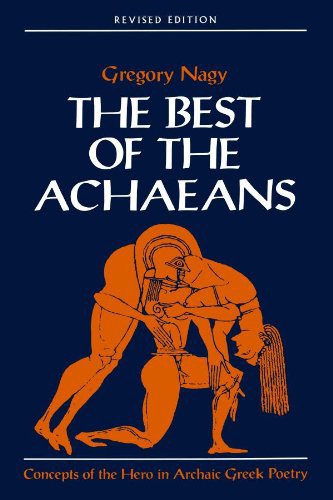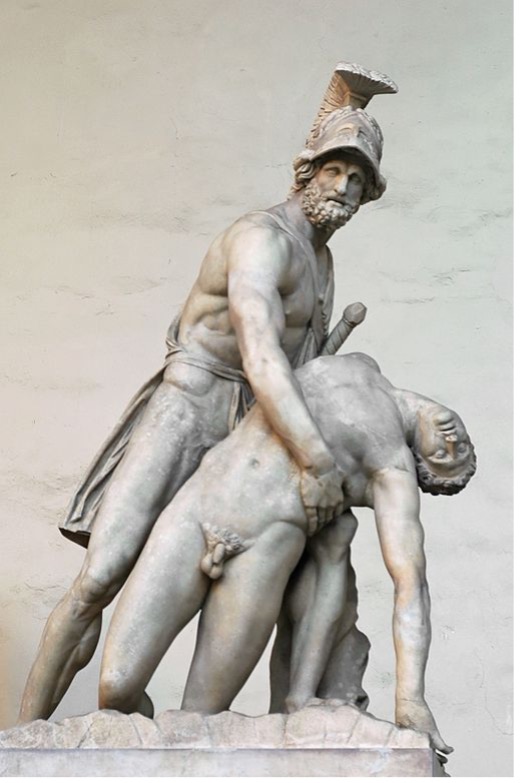Nagy, Gregory. 2023. “On the eclipse of Ajax as a most eligible suitor of Helen.” In “Γέρα: Studies in honor of Professor Menelaos Christopoulos,” ed. Athina Papachrysostomou, Andreas P. Antonopoulos, Alexandros-Fotios Mitsis, Fay Papadimitriou, and Panagiota Taktikou, special issue, Classics@ 25. https://nrs.harvard.edu/URN-3:HLNC.ESSAY:103900181.
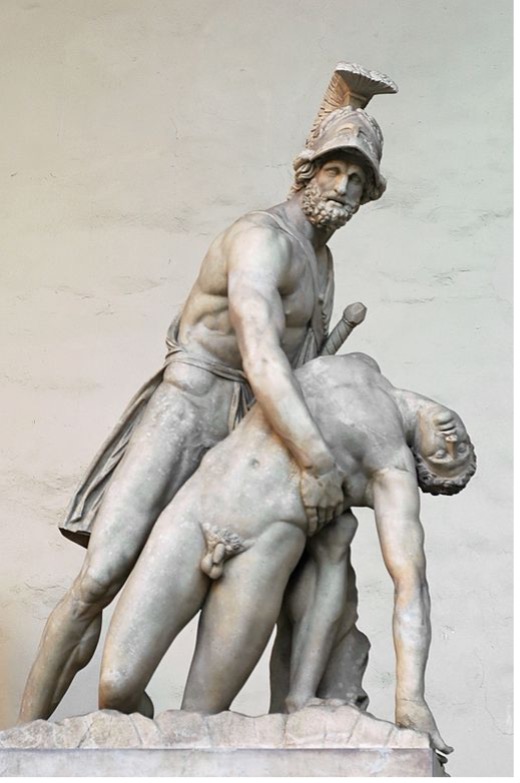
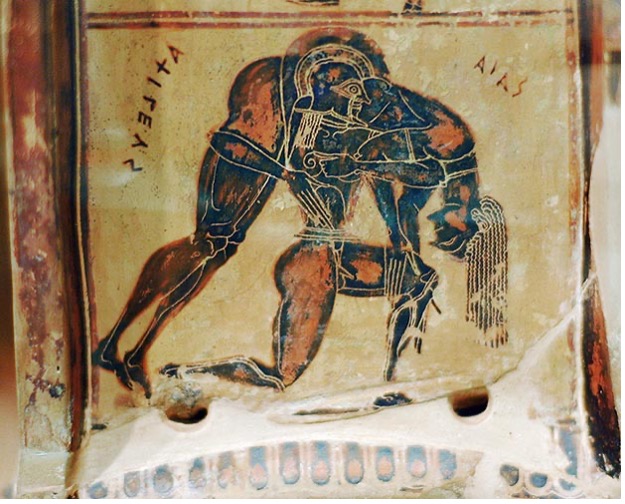
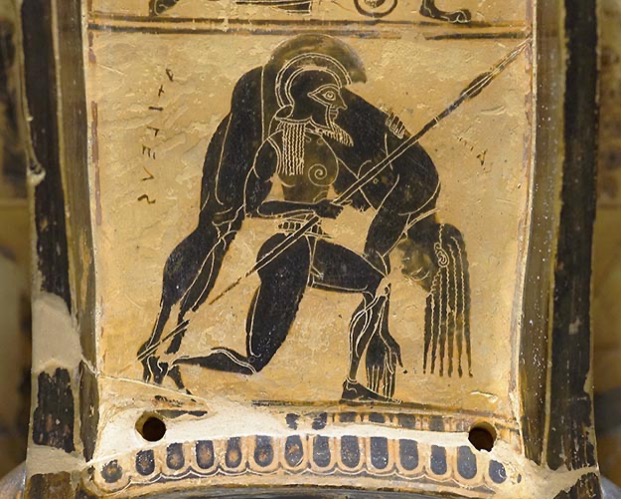
§1. The Hesiodic picturing of Ajax as a suitor of Helen is relevant to the evolution of my thinking in a book that dates back to 1990, Pindar’s Homer. What I now think is this: questions of poetic justice about the heroic status of Ajax are addressed more directly in the poetics of “Pindar’s Homer” and only less directly in the poetics of “our” Homer. To take this thinking further here, I need to give some more background by quoting from the book Pindar’s Homer my view of the poetics represented by the so-called Epic Cycle as compared with the poetics represented by Homeric and Hesiodic poetry. Here is what I said in Pindar’s Homer (Nagy 1990:73 at 2§39):
And then I added (2§39n106):
§4. I now quote the two most relevant texts, followed by my working translations. The first text will be the Hesiodic fragment, already mentioned, about Ajax the suitor, and the second will be a corresponding passage, also already mentioned, about Ajax in the Catalogue of Ships as transmitted in “our” Homeric Iliad.
45 μνᾶτο· δίδου δ’ ἄρα ἕδνα ἐ̣[ο]ι̣κότα, θαυματὰ ἔργα·
οἳ γὰρ ἔχον Τροιζῆνα καὶ ἀγ[χ]ίαλον Ἐπίδαυρον
νῆσόν τ’ Αἴγιναν Μάση̣τά τε κοῦρ̣ο̣[ι] Ἀχαιῶν
καὶ Μέγαρα σκιόεντα καὶ ὀφρυόεντα Κό̣ρ̣ινθον,
Ἑρμιόνην Ἀσίνην τε παρὲξ ἅλ̣α̣ ν̣αιετα̣ώσας,
50 τῶν ἔφατ’ εἰλίποδάς τε βόας κ[α]ὶ̣ [ἴ]φ̣ι̣α̣ μ̣ῆ̣λα
συνελάσας δώσειν· ἐκέκαστο γὰρ ἔγ̣χεϊ μ̣α̣κρῶι̣.
στῆσε δ’ ἄγων ἵν’ Ἀθηναίων ἵσταντο φάλαγγες.
§8. To illustrate the politics and poetics of hero cult in the case of Ajax, I draw attention to the contrast between the mentioning of Megara as one of the places dominated by Ajax in the Hesiodic passage and the omission of this city in the Homeric passage taken from the Catalogue of Ships as we have it. In fact, there is no mention of Megara anywhere in “our” Classical version of the Homeric Iliad and Odyssey. By contrast, the Megarian version of the epic verses about Ajax and Megara in the “Catalogue of Ships” tradition is still attested by way of Strabo (9.1.10 C394; I rely on the commentary by Figueira 1985:265). The omission of Megara in “our” Classical version of the Catalogue is a matter of Athenian politics. The island of Salamis, which had been the primary center for the hero cult of Ajax, used to be controlled by Megara, but control was lost to Athens already in the early sixth century BCE (Figueira 1985:261). There have survived only traces of information about the hero cult of Ajax in Megara (such information is noted in passing by Finkelberg 1988:41n51). An important source is Pausanias (1.42.4), from whom we learn two details of considerable interest:
- Ajax had a special relationship, inside the sacred spaces of Megara, with the goddess Athena, who was invoked there by way of the epithet Aiantis, which can be translated as ‘linked with Ajax’.
- The mother of Ajax, Eriboia/Periboia, was the daughter of the hero Alkathoos, king of Megara, and Ajax succeeded to the kingship.
§10. So, I stand by the argument I started to make at §6 of this essay: that the appropriation of Ajax, hero of Salamis, as an Athenian hero in “our” Homeric Catalogue of Ships should be down-dated from the era of the Peisistratidai, who controlled Athens in the sixth century, to a later era, within a time-frame that post-dates the Peisistratidai. It is within this later era that Ajax is significantly downgraded in his eligibility as would-be husband of Helen. By now, Ajax dominates only the island of Salamis, no longer all those vast stretches of the mainland in the Peloponnesus, so rich in cattle and sheep, where he had once been dominant, back when, in an earlier era glorified by Hesiodic poetry. Back in that earlier era, Ajax was ready to offer, as bride-price for marrying Helen, vast herds that grazed over all those lands in the Peloponnesus that he had formerly dominated. I quote again from my translation of Hesiod (F 204.50–51): ‘the shambling cattle and sturdy sheep of the people (who held all those vast lands) | he said he would herd them all together and offer them all as presents. That is how dominant he was, with his long spear’. By now, however, in a later era, as we see in the Homeric Catalogue of Ships, Ajax no longer possesses vast herds of cattle and sheep to offer as a bride-price. His status is by now overwhelmed by the dominance of Menelaos with the help of that hero’s brother Agamemnon, and their combined herds will ultimately win Helen for Menelaos. That outcome is predestined even in Hesiodic poetry, though Ajax here is still far more of a competitor than he is in the Homeric poetry of the Catalogue of Ships. In a follow-up essay (Nagy 2021.06.21), I analyze in detail a complicated passage in the Hesiodic Suitors of Helen (F 198.2–8) where the winning of Helen as bride of Menelaos is directly linked with a winning number of cattle and sheep offered as a bride-price on behalf of that hero. In bringing my present essay to a close, I quote only the verses where Odysseus himself recognizes the reason for the winning of Helen by Menelaos:
νικήσει, κτήνωι γὰρ Ἀχαιῶν φέρτατος ἦεν·
There is much more to be said about this passage, but I stop here, in honor of another Menelaos, who is a winningest of professors.

